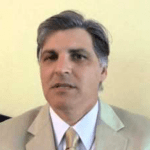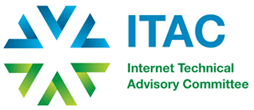The Internet Technical Advisory Committee (ITAC) to the OECD brings together the counsel and expertise of technically focused organizations, in a decentralized and networked approach to policy formulation for the Internet economy. The main purpose of ITAC is to contribute constructively to Internet-related policies developed in the OECD. It mostly contributes to the work of the OECD Committee on Digital Economy Policy (CDEP) and its specific working parties such as the Working Party on Communications and Infrastructure Services Policy (CISP) and the Working Party on Security and Privacy in the Digital Economy (SPDE).
Author: Nicolas Seidler
ITAC key messages
On 21 June 2016 after the conclusion of the ITAC Forum in Cancun, Mexico, the following messages were published.
Key messages to the OECD Ministerial on the Digital Economy 20-23 June 2016, Cancun, Mexico
About the Internet technical community
- The Internet technical community is an indispensable stakeholder and significant contributor to the global Internet governance dialogue. The organizations and individuals in this community have had over four decades of cumulative experience in creating, improving, deploying, and managing the Internet in almost all countries of the world.
- We share a common culture that is grounded in a clear understanding of the unique technical characteristics of the Internet.These characteristics are essential to the Internet’s past, present, and future success as a platform for advancing the economic and social well-being of all of its users.
- The principles that have promoted and sustained the development of the Internetsince its inception — the open and inclusive process for developing Internet protocols and standards, the impartial stewardship of Internet naming and addressing resources, and the decentralized cooperation and collaboration of network operators around the globe — are the Internet technical community’s critical contribution to debates on Internet governance and the future of the Internet economy.
Policies for a trusted Internet
- The most successful Internet policies enhance and are built on the Internet’s unique properties such as information-sharing, global reach and secure communication, resilience and its ability to enable collaboration and innovation at the edges.
- Some government decisions about the Internet are coloured by fear, distrust and uncertainty. Cyber strategies that focus on reaching “absolute security” risk closing countries off from its greatest benefits; openness, innovation and growth.
- Participation in the global digital economy means global interdependence and trust. Though they might at first seem to be vulnerabilities, the global interdependence and trust the Internet is built on are its greatest strengths and the source of its economic and social benefits.
- Policy-makers (whether domestic, regional or global) face a choice between two different paths forward. One path leads to an open, trusted, multistakeholder Internet and all the social and economic benefits it brings, while the other path leads to an untrusted and increasingly fragmented network that fails to drive growth and remains vulnerable to threats from outside. One path leads to opportunity, the other to stagnation. The key is trust, and how to sustain the Internet as a fundamentally vibrant and trusted space.
- There will always be risks and downsides to an open network – malicious actors will find ways to exploit vulnerabilities; and technologies and capabilities we develop to improve one part of life may impact another. But threats can be mitigated, risks and information distributed, weaknesses shared and repaired. The network’s very openness contains the means to protect it.
Multistakeholder policy solutions
- The Internet evolved within and alongside a system of multistakeholder governance where those affected by decisions have the opportunity to be part of them.
- All stakeholders share a collective responsibility for the continued vitality of the Internet and the benefits it brings our societies and the global economy.
- Building and sustaining a trusted Internet means different types of players – with different roles and responsibilities – need to take action, closest to where the issues are occurring.
- The Internet’s governance reflects the Internet itself; open, distributed, interconnected and transnational. Just as the Internet is interoperable, so are its governing parts.
Key priorities for the future of the digital economy
- Expanding Connectivity: Access to the Internet offers unprecedented opportunities to bridge economic and social divides. However, more than half the world’s population is not yet online. To expand global connectivity, and to improve affordability and accessibility, it is crucially important to harness the full benefits of the Internet as a platform for the digital economy driven by innovations at its edges. The goal has to be a policy environment conducive to private sector investments and competitive markets, one that supports the global adoption of Internet Protocol version 6 (IPv6) in order to extend the Internet address space, as well as the development of local content, not least through the introduction of International Domain Names (IDNs) and Internet Exchange Points (IXPs).
- Preserving the Open Internet: Global interoperability and preservation of the Internet’s end-to-end principle, where each node in the network can reach all other nodes in the world through a free flow of information, must be protected to ensure its utility as a platform for connecting people, and thus for education, innovation, creativity and economic opportunity. The use of open standards and principles of permissionless innovation at the edges of the network must be protected to ensure the Internet’s continued development as a general-purpose technology to benefit all stakeholders. Neither government regulation nor economic monopolies should delay or prevent the continued development of the Internet trough anti-competitive behavior.
- Ensuring trusted technologies: The continued growth of the digital economy is dependent on users and businesses knowledge that security and other policy objectives do not hurt their privacy expectations, online identities and fundamental rights. This trust can only be ensured through collaborative solutions, and by making multistakeholder participation the norm in all aspects of the Internet’s governance. It requires a legal environment that obliges, but also enables companies to support users rights, as well as a strengthening of the users’ understanding of the importance of security, and the skills needed to protect themselves and other users. Fostering the adoption of security protocols and standards developed in a bottom-up process, such as the DNS Security standard (DNSSEC) is also necessary.
- Strengthening the skills of users and workers: The sustainable development of the digital economy can only be achieved through strengthening the required skills of users and workers. Digital literacy, and the inclusion of ICTs in education and trainings, must be the norm in formulating capacity building policies in the future economy characterized by cross-sectoral digitalization – including targeted efforts for women, youth, and persons with disabilities.
OECD Ministerial 2016
>>> ITAC Key messages to the OECD Ministerial on the Digital Economy <<<
> About the Ministerial
The 2016 Ministerial Meeting, 21-23 June, in Cancún, Mexico, aims to move the OECD digital agenda forward in four key policy areas that are critical to the growth of the digital economy:
- Internet openness and innovation
- Trust in the digital economy
- Building global connectivity
- Jobs and Skills in the digital economy
8 years after the OECD Ministerial on the Future of the Internet Economy in Seoul, this High-Level event in Mexico will play an essential role in forging consensus around OECD countries’ policies for the future of an open and inclusive Internet. This Ministerial will also provide a visible opportunity to showcase the efficiency of the OECD’s multi-stakeholder advisory structure, which includes Internet technical (ITAC), business (BIAC), civil society (CSISAC) and trade union (TUAC) actors.
> ITAC Forum: 21 June 2016
The Internet Technical Advisory Committee (ITAC) will hold a full-day Forum on 21 June, as an official pre-event to the OECD Ministerial.
Agenda:
- 9:00-9:30am – Opening and Keynote address
- 9:30-10:45am – Real-world IPv6 adoption since 2018 [panel]
- 11:00-12:15pm – Open Standards for an Open Internet of Things [panel]
- 12:30-2:00pm – Lunch hosted by ITAC, BIAC, CSISAC & TUAC
- 2:00-3:30pm – Panel: A collaborative approach to Internet Security [panel]
- 5:30-6:30pm – Press conference by ITAC, BIAC, CSISAC & TUAC
=> Full program
> Useful links
- Ministerial website: http://www.oecd.org/internet/ministerial/
- Ministerial agenda: http://www.oecd.org/internet/ministerial/cancun-ministerial-agenda.pdf
- Registration: https://oecd.infoexpo.com.mx/2016/ae/web/en
- Ministerial Hackathon: http://biac.org/connectedcommunities/
- ITAC members: https://www.internetac.org/members
 By Constance Bommelaer, Senior Director Global Internet Policy, Internet Society -and Nicolas Seidler, Senior Policy Advisor – Internet Society
By Constance Bommelaer, Senior Director Global Internet Policy, Internet Society -and Nicolas Seidler, Senior Policy Advisor – Internet Society
The OECD Ministerial Meeting on the Digital Economy, held in Cancun on 21-23 June 2016, gathered more than 1300 participants from around 50 countries.
Ministers, along with high-level representatives from the Internet technical community, civil society, private sector and trade unions, all converged towards the need for an open and trusted Internet as a pillar of a growing and inclusive Digital Economy. These elements, along with acknowledgement of the value of multistakeholder cooperation in policymaking, are reflected in the formal outcome of this Ministerial, the “Cancun Declaration” on the Digital Economy.
By Walid Al-Saqaf, Internet Society Board of Trustee, postdoctoral researcher at Stockholm University
 Simply put, the blockchain can act as a virtual public ledger that records transactions processed and maintained by a network of communicating nodes running cryptocurrency software. It was invented in 2008 as part of Bitcoin by a person with the computer nickname ‘Satoshi Nakamoto’. It was envisioned as a peer-to-peer payment system and digital currency that can be transferred between any two users connected to the Internet, without using any intermediary.
Simply put, the blockchain can act as a virtual public ledger that records transactions processed and maintained by a network of communicating nodes running cryptocurrency software. It was invented in 2008 as part of Bitcoin by a person with the computer nickname ‘Satoshi Nakamoto’. It was envisioned as a peer-to-peer payment system and digital currency that can be transferred between any two users connected to the Internet, without using any intermediary.
While none of the panelists who replied to my intervention[1] ended up talking about the blockchain technology itself, they did acknowledge the need to embrace such new and innovative technologies so that they could be used for the betterment of societies. I thought that was a good sign.
By Robin Wilton, Technical Outreach Director for Identity and Privacy, Internet  Society
Society
During the OECD Ministerial in Cancun, I had the pleasure to moderate an ITAC panel discussion entitled “Collaborative Approach to Internet Security”.
In a very wide-ranging discussion, both the panel and the audience examined Internet security issues from a variety of perspectives. Early questions from the audience set the direction for the event and included:
- We can all envisage how things might look in 10 years’ time, but how can we get a clearer picture of the next steps that will lead us there?
- Security is often portrayed as consisting of Confidentiality, Integrity and Availability, yet we seem to spend 90% of our effort on confidentiality, 9% on availability, and the scant remainder on integrity. What can/should we do about that?
- How can we increase trust in the Internet, and both the perception and reality of trustworthiness?
IPv6: The Ball Is Rolling
By Marco Hogewoning, External Relations Officer (Technical Advisor), RIPE NCC 
It was in the 2008 OECD Ministerial meeting in Seoul that the OECD member countries took it upon themselves to: “Encourage the adoption of the new version of the Internet protocol (IPv6), in particular through its timely adoption by governments as well as large private sector users of IPv4 addresses, in view of the ongoing IPv4 depletion.”
A lot has happened since then, and in anticipation of the 2016 OECD Ministerial meeting, which took place June 21-23 in Cancun, ITAC organized a panel to focus on the progress made during the last eight years and discuss the remaining challenges in the global adoption of IPv6 in both the public and private sectors.
By Laurent Liscia, CEO of OASIS
The following is a statement by Laurent Liscia, CEO of OASIS and spokesperson for ITAC during the press conference following the OECD Ministerial Meeting’s Stakeholder Day.
“First, let me name a few highlights among the 9 principles the OECD Ministers agree on:
- Support the free flow of information
- Increase broadband connectivity and harness the potential of interconnected and converged infrastructures and digital services
- Embrace the opportunities arising from emerging technologies and applications
- Promote digital security risk management and the protection of privacy at the highest level of leadership
By Karen McCabe, Senior Director of Technology Policy and International Affairs at the IEEE Standards Association.
 A segment at the ITAC Forum held during the OECD Ministerial this past June was dedicated to a thought provoking discussion on Open Standards for an Open Internet of Things (IoT).
A segment at the ITAC Forum held during the OECD Ministerial this past June was dedicated to a thought provoking discussion on Open Standards for an Open Internet of Things (IoT).
Joining the interactive panel were Laurent Liscia, CEO and Executive Director at OASIS, David Conrad, Chief Technology Officer at ICANN, Monique Morrow, CTO, Evangelist for New Frontiers Development and Engineering at CISCO, Roberto Minerva, Research Coordinator at Telecom Italia Lab and Chair of the IEEE IoT Initiative, Elsa Chan, Co-Founder of Jetlun, and Luis Kun, Professor of National Security at the Center for Hemispheric Defense Studies at the National Defense University.
Working together
By Jari Arkko, Chair of the Internet Engineering Task Force *
 In my experience it is important that we talk to each other, all of us, the techies, the operators, the economists, and the policy people. We live in a connected world that is developing very rapidly, and none of us have a full picture of everything. It benefits us to share our views and increase our understanding.
In my experience it is important that we talk to each other, all of us, the techies, the operators, the economists, and the policy people. We live in a connected world that is developing very rapidly, and none of us have a full picture of everything. It benefits us to share our views and increase our understanding.
I want to start off with a personal perspective on three areas where mixing people with different backgrounds has been very useful.
